Frontline Reports
World Relief DR Congo is Building Resilience from Ashes
The Eruption
On May 22nd in the town of Goma, DR Congo, Mount Nyiragongo lit up the sky with a red glow. Many of the 2 million residents recognized the signs and feared the worst — the towering volcano was once again active. By early evening, their fears were confirmed when the volcano began to spew lava.
With orders to evacuate, many residents gathered what belongings they could and fled toward neighboring Rwanda and other areas in DR Congo. While the lava flow stopped short of reaching Goma, it destroyed the homes and livelihoods of thousands of people in the surrounding area.
Our own World Relief Congo staff were among those temporarily displaced from their homes and workplaces. And yet, they continued to care for local communities.
Following the eruption, World Relief dispatched a field team to assess the scale of the disaster. Along with partner agencies, they found that close to 95,000 people in 20 villages have been directly impacted by the eruption including the complete destruction of 3,873 homes, 13 schools, seven churches and three health centers. More than 20,000 residents were displaced and over 30 people died.
A Neglected Crisis
For DR Congo, the recent eruption of Mount Nyiragongo is the latest in a decades-long struggle for stability. The nation faces ongoing conflict between multiple armed groups. Sexual and gender-based violence and trauma are commonplace. Frequent attacks on villages disrupt people’s ability to feed and provide for their families.
Food insecurity has been identified as a neglected humanitarian crisis in DR Congo. Natural disasters like earthquakes and volcanic eruptions put even greater strain on limited resources. The eruption of Mount Nyiragongo is expected to have long-lasting effects on health, livelihoods and stability in Eastern DR Congo. Farmland, which people in nearby villages rely on to feed their families, has become unusable, covered by hardened lava rock. World Relief is collaborating with local communities and aid agencies to respond to this disaster and find solutions for these ongoing crises.
A Vision for Change
World Relief has a strong legacy of this kind of collaborative work in the region. For almost 20 years, we have partnered with local churches and communities to facilitate healing and stability in DR Congo.
World Relief Congo staff member, Berger Bireo, shared, “It’s easy to be overwhelmed and discouraged by [DR Congo’s] conflict-ridden history. There are days when I myself struggle to see beyond these seemingly devastating challenges. Yet, I believe that God gave us the very instrument needed to establish peace in DRC: the Church.”
At World Relief, we believe that when the church is mobilized to achieve its full potential, it has the power to change our world. And we’ve seen it happening in DR Congo.
Churches and believers in DR Congo are uniting around their shared identity in Christ to care for the vulnerable in their communities. Last year, World Relief partnered with local churches to provide 400 farmers with training on improved agricultural techniques, assist 450 women with post-Sexual and Gender-based violence care and provide access for 375,535 people to community-based conflict resolution mechanisms through our village peace committees.
In partnership with the local Church, we are addressing holistic factors that can not only increase stability in communities entrenched in conflict, but also bring physical, emotional and spiritual healing to the nation. This work is bringing real, lasting change that will help DR Congo become more resilient in the face of natural disasters like the recent volcanic eruption.
Not Forgotten
Although DR Congo is home to one of today’s most neglected crises, God has not forgotten the people in the “Heart of Africa.” And, in the face of natural and man-made disasters, neither has World Relief.
Amanda Patterson, HDRU Program Office for DR Congo and South Sudan, shared, “We know that this event is just one more challenge that the Congolese people must overcome. The silver lining is that the global spotlight will once again shine on DR Congo. It is a country that gets so little attention, and yet in sheer numbers alone, DR Congo is the number one country facing the largest global hunger crisis.”
As Goma and the surrounding region recover from the eruption of Mount Nyiragongo, we remain committed to improving long-term peace and stability in DR Congo. We will continue working alongside local churches to help them realize their own resources and power, through the Spirit, to transform lives.
Source: https://www.wfp.org/countries/democratic-republic-congo
You and your church can join us in empowering local churches and creating lasting change in places like DR Congo by joining The Path.

Kelly Hill serves as a Content Writer at World Relief. She previously served as Volunteer Services Manager at World Relief Triad in North Carolina before moving to Salt Lake City. With a background in International and Intercultural Communication, she is passionate about the power of story to connect people of diverse experiences.
No Longer Alone: How Mothers in Rwanda are Working Together To Care for Children
Every day, parents around the world, make the difficult choice between staying home with young children or leaving them home alone in order to work and provide for their families. Eunice is one of these parents.
Eunice is a farmer and mother in Rwanda. For her and many women like her, farming is not only a way to earn income, but to also grow food to feed her family. When her children were infants, she could tie them to her back while she worked. But once they became toddlers, it was no longer safe for them to accompany her to the fields.
Like many other mothers in her community, Eunice had to make the difficult choice every day to leave her children home alone. For families in situations like Eunice’s, it’s routine for two- and three-year-olds to be left home alone or in the care of siblings who are just a few years older.
Unfortunately, this impossible choice between providing and being present can impede early childhood development. Young children thrive when they feel safe, receive responsive and playful parenting and are provided with early learning opportunities through play. But without these, children miss out on building an essential developmental foundation that will help them reach their full potential into adulthood.
For Eunice, she knew her situation was not ideal — she worried about her children every time she had to be away in the fields. She hoped they didn’t get hit by a car or abused because they were home alone.
Sadly, her fears were realized. She learned that her children were crying all day and that the food she left out for them was being eaten by older children who were sneaking into her home.
And yet, hope was on the way.
Thanks to support from people like you, a group of local pastors had been trained by World Relief and felt convicted about the need to work together to care for vulnerable people within their community. When they heard about the challenges Eunice and other families were facing, they decided to come together and discuss how they could help.
The pastors visited Eunice and invited her to a training held at a local church. There, church leaders helped Eunice and a group of other mothers work together and develop a plan to provide safe care for their children.
Collectively, the mothers had 20 children between them. They selected one woman’s home as the place where they would send their children to be cared for. Each day, four mothers stay behind with the children while the others go to the fields. The mothers rotate between these responsibilities, each covering childcare one day a week.
For the first time, Eunice and the other mothers knew their children would be safe.
In addition to solving their childcare problem at the training, the mothers received valuable lessons on child development and nutrition. Eunice’s children are now receiving quality childcare as well as balanced nutritious meals. She said she and the other mothers are rejoicing and their kids are happy again.
Currently, 17 Home-Based Early Childhood Development (ECD) Centers like Eunice’s are being piloted in World Relief’s Ngoma Church Empowerment Zone in Rwanda. One of the local pastors has been so impressed by the Centers already that he has written to government officials to share what the moms have been doing, urging them to implement similar systems in all rural communities.
The ECD Centers are meeting a pressing need and creating lasting, sustainable change for families, even in the most remote village. Not only do they bring peace-of-mind to mothers, but they provide children with the foundational care and learning opportunities they’ll need to reach their full potential long into the future.
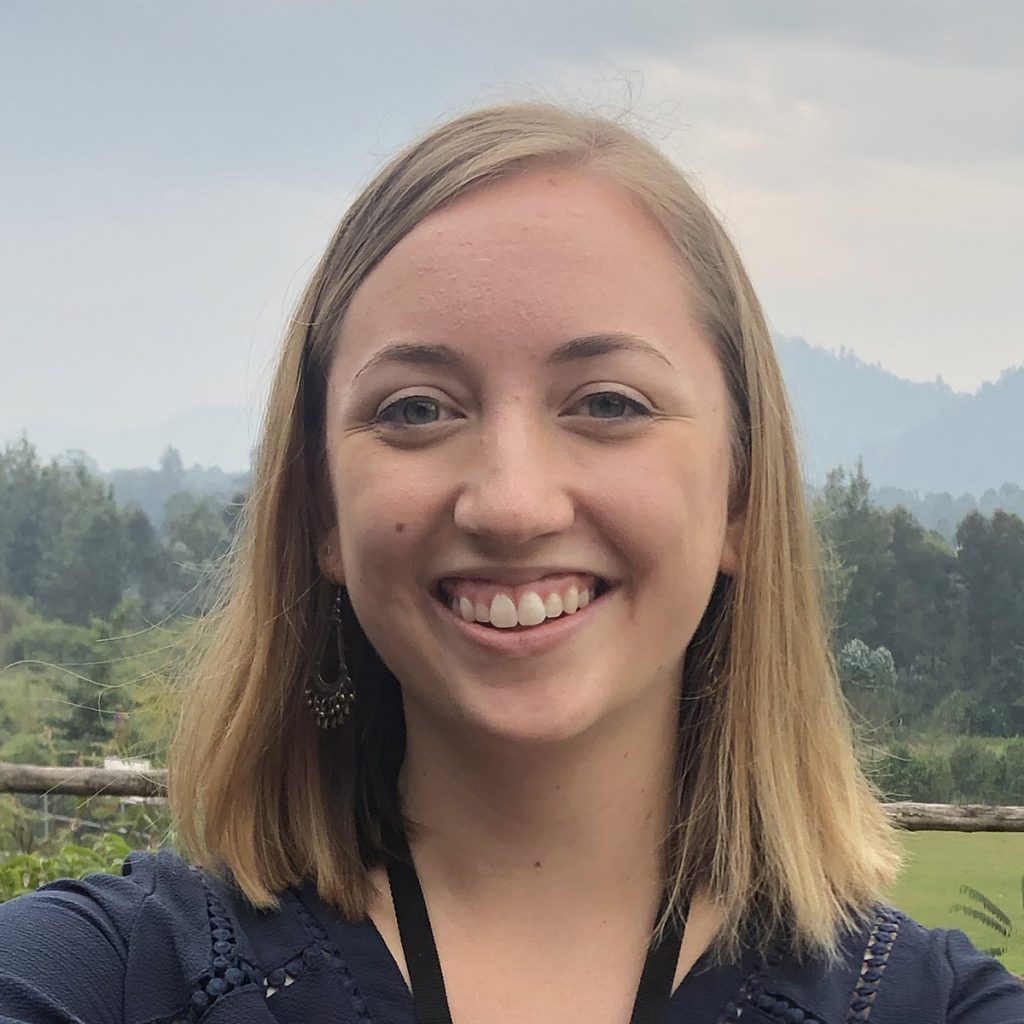
Dana Pair currently serves as Program Officer at World Relief. Prior to joining World Relief, she worked in adolescent girls programming in the Portland, Oregon area. She is passionate about empowering women and girls to bring sustainable change to their communities.
Beneath the Chaos Resilience Bloomed: Our Global COVID Response
It was three o’clock on a Tuesday afternoon when Laura Fontaine, Director of World Relief Quad Cities, got the call. A woman in the Congolese community had contracted COVID-19. Shutdowns had already begun across much of the U.S., and World Relief followed suit, closing our offices and suspending all in-person programming.
Halfway across the globe, nearly 8,000 miles away, Moses Ndahiro and his team faced a similar situation in Rwanda when, in mid-March, the country went into total lockdown. As the team began working remotely, they turned to rapid communication tools through mobile platforms like WhatsApp to begin communicating with partners and disseminating COVID-19 prevention messages to churches and communities.
The sudden change and continued uncertainty were destabilizing, and it didn’t take long for the dramatic impact that COVID-19 could have on the world’s most vulnerable to become apparent.
And yet, during what was a very dark time, when we took a step back, we saw creativity, strength and persistence shine through. Fierce courage and bold love grew amidst our upturned world. Beneath the chaos, resilience bloomed.
World Relief Malawi’s New Country Director is a Role Model for Girls
On an early morning in April, World Relief Malawi staff gathered together in Lilongwe for a socially distanced outdoor ceremony. Staff from abroad called in virtually. There was prayer, there were speeches, there was commissioning. The purpose? To welcome Matilda Matitha as the new World Relief Malawi Country Director.
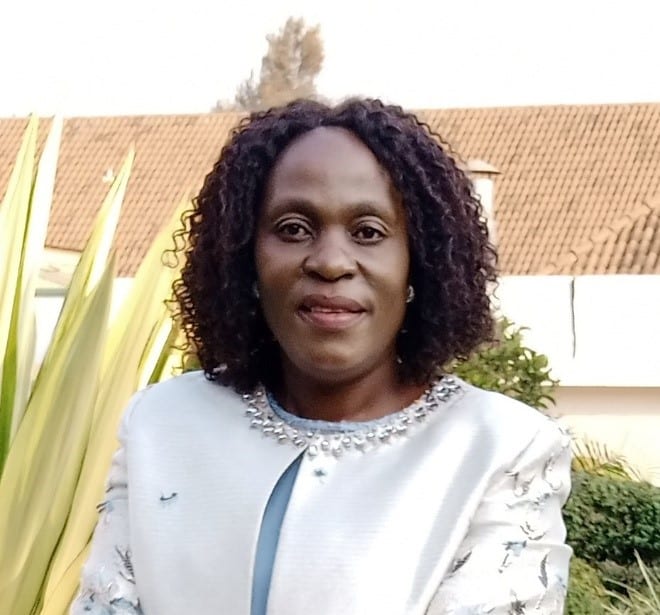
Matilda is one of three women who have been promoted to Country Director in their respective countries over the last year. I recently connected with Matilda over Zoom where we talked about gardening, our favorite places to go for walks and her passion to empower women and girls throughout Malawi.
“Looking around Malawi, you will find that there are very few women in leadership positions,” Matilda said. “So when this message came to me — Matilda apply! Matilda apply! — I thought, ‘I have to so that I can be a mouthpiece for women. I can be an inspiration to young girls who are struggling out there in the village.’”
I am excited to share part of our conversation with you today, and I hope you are as inspired as I was by Matilda’s vision for addressing extreme poverty, child development and gender issues while also being a role model for girls in Malawi and beyond.
Thanks for being here today, Matilda. I’m excited to chat with you today.
Yes, thank you.
First, how long have you been working at World Relief, and what did you do before you became Country Director?
I joined World Relief in January 2017 as a project manager for the scaling up nutrition project. Before joining World Relief I worked with different international organizations coordinating and managing nutrition projects — both in emergency contexts where we distribute food to malnourished children as well as in development contexts where we roll out health education and promotional health messages. I have always enjoyed working with children in nutrition work.
What prompted you to take on the leadership role of Country Director?
First and foremost I applied to this position is because I felt God was calling me to lead this organization. To be frank, I never dreamt to be here — to be a country director. When the job was first posted, I did not apply. But then I got encouragement from a lot of people. They said, Matilda, I think you would be a good leader, you should apply. So I said, I think God wants me to do more than just be a Manager. So, it was more of answering his call.
But then I also felt it was time, because looking around Malawi, you will find that there are very few women in leadership positions. Because of social norms in Malawi, already parents prefer a boy to go to school and a girl to marry. Especially when resources are minimal, parents think that after a girl marries, the husband will also be able to take care of them. So girls are already disadvantaged at a very young stage.
Recent studies have shown that only 3% of young Malawian women have a degree. So out of that, it means that there are very few women in leadership positions. So when this message came to me — Matilda apply! Matilda apply! I thought I have to so that I can be a mouthpiece for women. I can be an inspiration to young girls who are struggling out there in the village. I can also encourage women. So I said, “Let me take the challenge!”
What are some of the goals and dreams you have for the communities we serve in Malawi?
I want to have a strong church. I would really like to strengthen our Integral Mission work so that we have a church that is able to respond to God’s call. God wants the church to help people who are marginalized, people who are sick and the poor. That is the role of the church so if we can strengthen the church and help the church understand its role, then whatever we are doing we will find that a strong church is our foundation — that is my dream, to expand what we are doing.
What are one or two of the biggest challenges you hope to address in Malawi?
In Malawi, there is a lot of poverty. If we could do more sustainable economic empowerment, we would be able to get our communities out of deep poverty. If we are able to move them even just a little bit, most of the issues that we are struggling with, we can find solutions — like issues of education, health, nutrition. These issues occur because people are living entirely in poverty.
The other issue is, since I was in college, I have had a passion for the girl child. As an undergraduate, I went on a project where we were mobilizing girls to go back to school. So now I would love to incorporate gender ministry into whatever we are doing. I would also like to see more gender ministry within the staff and the churches so that issues of gender-based violence that are very rampant in Malawi would be reduced.
How are World Relief’s programs addressing these challenges?
Some of our programs, like Families for Life, are already addressing these issues. If we have a strong family, most of the issues we are struggling with in terms of gender can also be resolved. Programs like FFL need to be scaled up, as do programs like child development where boys and girls are empowered and taught about what is right. Sometimes things are happening to girls because the girls don’t know that what’s happening to them isn’t right. So, growing our child development program would be very good. In terms of economic empowerment, we can look at the Savings for Life program. We need to scale up these projects because we have seen a lot of success and heard a lot of good stories. But we need more resources to be able to scale these innovations.
What has been your favorite thing about working at World Relief so far?
The spiritual component has benefited me quite a lot as a person. When I first joined World Relief, I was a Christian. But some things I would not do as a Christian. But now being in World Relief, there is a component of spiritual formation where we share the word of God, we have prayer and fasting. That has helped me grow in my spirituality. I have been able to exercise some of the spiritual disciplines like prayer and fasting.
Another thing is in the past, I was not able to share the word of God. Every time someone would say, “Matilda share the word of God,” I would shy away. But now at World Relief, we share the word of God every day. I’m able to share it with my children and my husband. Every night at eight o’clock we sit and read the Bible and share the word of God. And also in terms of giving. I do a lot of giving and charity work — things that I could not do before World Relief. I pay school fees for two girls. So these are all fruit of being a member of the World Relief staff.
What advice would you give to other women who are leading in the community development areas?
We need to raise the banner for gender equity high, and very high. We need to be advocates for others, to share our story. We now have an opportunity to influence the environment. In some institutions, they don’t have policies in gender equality, while in other organizations policies are there, but they are not reinforced. As women working in development, we have a role to ensure that the working environment is enabling for women and girls who are fighting to get better, to be involved in what’s happening.
We also need to do more in terms of sensitizing the community at large. The government can create an enabling environment, but services are sometimes not accessible because of social norms. We need to sensitize parents that girls are not for marriage. Girls should also be encouraged to use their God-given skills and talents.
And also… the women and girls should be empowered to fight for their goals and their dreams. Like for myself. It was not easy to get here. I had to fight for my goals and fight for my skills. Women and girls should not just give in to social pressure. Social pressure will always be there, but we need to speak out and encourage these women, and as role models, we just need to be there for them and share our stories with them so they will continue to fight and know that it is possible to win.
Sometimes when you are doing something that is opposite to what society is expecting, you are seen as abnormal. We need to continue to show both men and women that we can work together and make our country, Malawi, a better place.
Can you share one story from your work that has encouraged you?
I remember this mother who had twins. We were working to strengthen referrals between community members and health facilities, to ensure that mothers were able to go to the health center in a timely manner.
We created Care Groups and they were trained on how to screen children for childhood illnesses and when they might need a referral. Often, people in Malawi don’t believe malnutrition is due to lack of food. They still think it’s some taboos — like maybe it’s because the husband is promiscuous. That’s the belief out there and one of the things we need to address.
When I met this mother, one of her children, at 16 months, could not attain milestones such as crawling because she was underweight. The malnutrition may have been worse because there were twins, so maybe she was struggling to feed both of them. We referred them to the health facility where the child received Plumpy’Nut for a month. After that, they came back to the community and we continued counseling the mother on how to feed both of her babies. We also assisted her with livestock so that she could raise chickens and take the eggs to feed the babies. And we encouraged them to have a backyard garden so they could use the vegetables to feed the babies.
This past February, we followed up with these kids. They are four years old now, and it is very exciting to see them. When I look at that baby, it brings a lot of joy inside me. If it hadn’t been for World Relief, I don’t think she would have been alive. Many children in Malawi don’t reach their 5th birthday, and the reasons they are dying are preventable. Our volunteers are doing a very good job identifying these women and encouraging them to go to the health facility for assistance. That’s one thing I like about doing nutrition projects — when your programming is good you can immediately see results, saving the lives of children.
We are so grateful for Matilda and all of our Country and U.S. Office Directors. Please join us by praying for them — that God would give them wisdom as they lead and for continued strength and unity among their teams. And pray that God would bring their vision for community transformation to fruition.

Rachel Clair serves as a Content Writer at World Relief. With a background in creative writing and children’s ministry, she is passionate about helping people of all ages think creatively and love God with their hearts, souls and minds.
All My Hope: A Refugee Story
Long Distance Love
On the morning of February 17th, Rafia woke up and prepared a feast for the arrival of her husband, Abdinasir. But when an unprecedented snowstorm hit the Mid-south, Abdinasir’s flight was canceled and he got stuck in Chicago. Rafia, however, was undeterred.
The next morning, she woke up and cooked another welcome-home meal for her long-awaited husband. But again, for the second time, his flight was canceled.
For five years, Rafia and Abdinasir had communicated only by telephone calls. The two met as refugees at a camp in Kenya after fleeing their home country of Ethiopia. When they were married in January 2015, they never imagined that the first years of their marriage would play out like this.
“I loved and married this person, and this person was leaving me,” Abdinasir said through a translator. “It was very hard on me to grasp the reality of it, but in everything, it’s God’s will, so I did not have any control.”
Rafia’s resettlement paperwork had been filed separately from Abdinasir’s before they were married. There was no time to change it between their wedding and her departure 11 months later, so when her visa was approved, she left for the United States, and Abdinasir was left behind.
Rather than spending the honeymoon period together, the couple found themselves in a long-distance relationship. Moreover, when Rafia arrived in the U.S., she discovered she was pregnant.
“Everything kept twirling in my head,” Abdinasir said. “My life was just one surprise after the other. All of the sudden she got there, and she was pregnant.”
A Baby on the Way
From a distance, Abdinasir watched as his wife carried his child and suffered through six months of morning sickness in a completely new country, alone. Her pain was so great that Rafia considered terminating the pregnancy. Thankfully, a new friend from her home country of Ethiopia stepped in to provide support, and Rafia was able to carry the baby to full-term. But her difficulties didn’t stop there.
Due to labor complications, her baby was delivered through a cesarean section.
When she was sent home from the hospital in Atlanta, she was unable to care for herself or the baby because of the strain it would place on her wound. Eventually, she was forced to return to the hospital due to an infection.
This time, another friend took her under his wing, giving her lodging and helping with her newborn when he could. His job as a truck driver, however, often took him away from home for weeks at a time, and Rafia struggled to care for herself and her baby in his absence.
“Even though I laugh about it, sometimes I don’t even want to remember it because it was a very painful experience,” Rafia said.
Meanwhile, Abdinasir was still in a refugee camp on the other side of the ocean. With no news of when his visa would be processed and approved, he could only watch his daughter grow up through a phone screen.
“Her leaving me behind, and me being alone, was hard enough,” he said. “The fact that she was here, pregnant, alone and going through all of that was just another heartache for me. I was not here physically, but I was just feeling all the pain.”
Hope on the Horizon
Slowly, Rafia regained her strength and was able to meet others within her community. Eventually, she moved to Memphis, and with the help of a friend, she contacted World Relief’s local office to start the process of bringing her husband home.
“Life was getting better afterwards, and I am grateful for everything. Even though once upon a time I thought this was just the end of me, that I was just going to rot and die alone,” Rafia said. “But once I got [to Memphis], I told them all my story. They were able to process the visa for Abdinasir, and now he’s here. In many, many, many ways, my survival was because of World Relief.”
In March 2020, four years after their wedding, Abdinasir and Rafia received the news that his visa was being processed. For the first time in a long time, the couple had hope.
“I heard a lot about World Relief, and the fact they would do everything in their power to reunite families,” Abdinasir said. “That gave me the biggest hope that they would do anything and everything to unite us.”
Each time Abdinasir called his family after that, his daughter would ask the same question: “Daddy, when are you coming?” And each time, the truth that he would soon be with them became a little more real. If Abdinasir could have had it his way, he would have grown wings and flown out at that moment.
Instead, he and Rafia drew strength from their faith and maintained hope in God’s plan for their lives, counting down the days to when Abdinasir would arrive and they could begin life as a family. After five years of waiting, a delayed flight in Chicago was nothing for the couple.
Finally Reunited
On the morning of Abdinasir’s arrival, Rafia eagerly awoke. But this time, she didn’t cook a welcome-home meal. Jokingly, she said Abdinasir could eat what was left over from the other two meals she made. Instead, she and her daughter waited patiently at the airport, giddy with excitement.
When Abdinasir finally landed in Memphis his first thought was who should he kiss first — the daughter he was meeting for the first time or the wife he had said goodbye to five years ago? Overwhelmed with emotion, he embraced his wife first then turned to hug his daughter for the very first time.
“It’s my turn now since she’s been through all this hardship all this time alone. I just really want to be the anchor for my family and be the man of the house for everything going forward,” Abdinasir said.
A month into his new life with his wife and daughter, Abdinasir is working hard to learn English and find a job. His prayer is that this is just the start and not the ending. He is filled with hope as he thinks of the future that lies ahead of his family — one that he had never thought possible when he was forced to leave his country so many years ago.
“Coming from all the horror stories and everything else, you come here and you’re a human. You have rights,” he said. “To me, I have left all the troubles and everything right there where I came from. Nothing but the best moving forward, and that’s all my hope.”
Give today and help us welcome and reunite more families like Rafia and Abdinasir. Together, we can build communities of love and welcome that we all feel proud to be a part of.
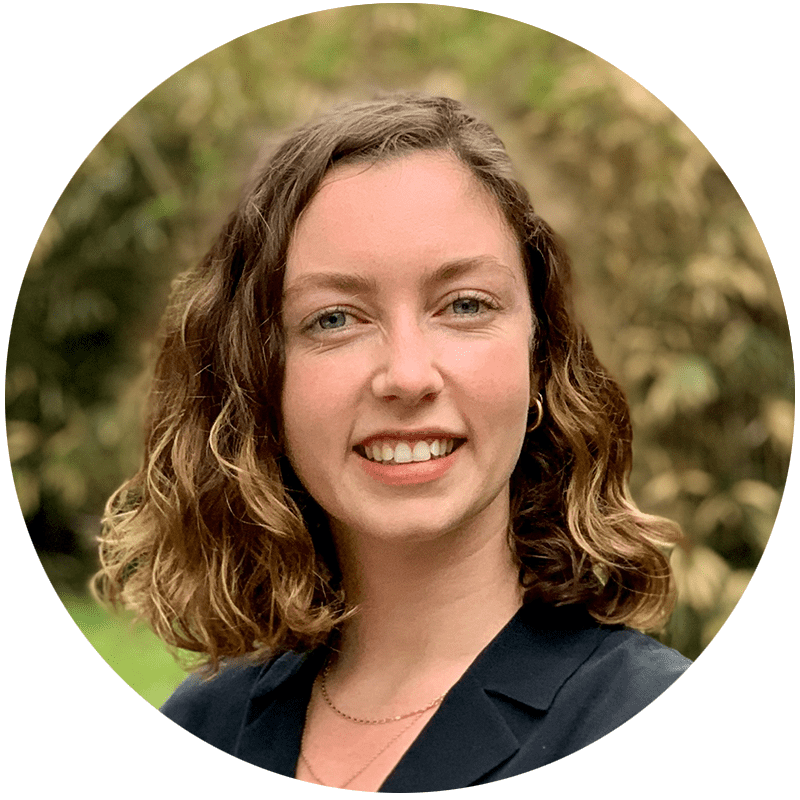
Bailey Clark serves as the Communications Coordinator for World Relief Memphis. With a background in journalism and advertising, she is passionate about storytelling and its power to make a difference.
The Secret Behind Her Smile
Never Again
April 7th marks the beginning of 100 days of commemoration of the 1994 Genocide against the Tutsi in Rwanda. This is a special time to remember more than a million people that were murdered because of the way they were created. It is a time to grieve but also to unite and rebuild a new generation and a new Rwanda that has a vision of moving forward towards development. The Genocide against the Tutsi was a horrible tragedy no one wishes to see happen again, so we commit ourselves to never let it happen again in our country or elsewhere and say ‘Genocide never again’.
While it is often hard to look back on the tragic events in our past, I see only hope when I look around at the Rwanda of today. All around me I see people and communities that have been reborn and made new. And in my work at World Relief, I am happy to get to witness and share so many of these stories of hope. Stories of women like Tuyisenge Valerie, a 43-year-old wife and mother to three kids.
Valerie’s Story
I first met Valerie while visiting Nyamasheke Church Empowerment Zone. Her genuine and beautiful smile caught my attention. Even though I already knew her as one of our project beneficiaries and have heard a lot about how strong and influential she is in the community, I always wanted to know more about the person behind her smile and courage. I asked her if she could share her story and she said “yes” with her beautiful smile.
“My life story always changes people’s hearts so if you want to share it with the world I am happy with it, as long as it will help others and improve the way they envision their future. This is my calling and passion, to touch as many people’s lives as possible with my story,” she said.
Valerie is a survivor of the 1994 Genocide against the Tutsi, when her parents and all 12 of her siblings were murdered. During this horrific tragedy, she was also sexually assaulted. In the wake of these events, Valerie was left feeling helpless and lonely. She faced extreme trauma and was put under medication to ease her pain and tension. She always felt lonely, even though she was being taken care of by the government through the 1994 Genocide Survival Fund, which provides access to money to support her and takes care of her medical needs.
Despite her trauma, Valerie is friendly and loves supporting others in need. She used to provide counsel to and advocate for those who were hurting, especially other survivors. This prompted her to be elected as the head of an organization named ‘IBUKA’, which connects various groups who aid survivors of the 1994 Genocide against Tutsi in her village. This leadership also paved the way for her to join The National Women Council which is a group responsible for advocacy, capacity building and social mobilization through women empowerment projects, and which fights against domestic violence and advances women’s rights.
In August 1996, Valerie got married to Celestin Kitabonindege. A year later they were blessed with their firstborn and later had four other children together. Unfortunately, the second and fifth born died when they were still infants. After losing their last born in 2006, Celestin wanted to have more children, yet Valerie did not. Celestin became angry and abusive, and eventually, in 2016 he left her for another woman, with whom he had three more children.
Valerie thought that her life was over. She had depended so much on Celestin due to the fact that he had loved her after all she went through after the genocide. And so she became desperate again, for she was left with 3 kids and in a small house. Their life was not easy and she depended only on the money that the survival fund could provide for her.
The Tuzamurane Project
Valerie’s suffering continued until 2019, when World Relief, in partnership with Starbucks, started the Women’s Empowerment, or Tuzamurane project. The project aims to “empower women to thrive through safe relationships, healthy homes, clean drinking water and economic opportunity,” and provides different lessons to help women sustain themselves towards development.
Behavior change for transformation, in addition to hygiene and sanitation, women and child rights, and economic development lessons were among lessons provided.
“The behavior change lesson that pictured a tree among all, saved my life. I realized that I had false beliefs as roots that made my life continue to be miserable. I was focusing only on what had happened to me which made me not have hope for a better future. But the more we went through these lessons, the more my mindset changed. And I started thinking differently looking ahead for a better future,” said Valerie.
Through the Tuzamurane project, Valerie met other women who had been through similar circumstances as she had. She gained friends through social women’s gatherings and began to find the support she needed to heal and speak up for herself. She also joined a savings group, which helped her grow her finances. Eventually, she was able to build two houses, one for her family and another one for rent to earn income. In addition to that, she opened a clothing shop which she still runs today. Valerie says that her life has been completely transformed by the community and the programs she found through Tuzamurane.
“I got my life back ever since World Relief came into my life through the project Tuzamurane,” she said. “I became open and able to face my fears and problems.”
Hope & Healing
Today, Valerie has reached a point in her healing that she now helps other women who have suffered domestic violence and/or other tragedies that have made them suffer. She helps them overcome their pain, fight for their rights and rebuild their lives through economic and career development. She is so grateful for what she acquired which made her draw near to God and thanked Him for having brought World Relief into her area.
Celestin also decided to apologize to Valerie and she forgave him. They got back together last year and are joining hands in building their life together in harmony.
As we remember the 1994 Genocide against the Tutsi, Valerie is ready to help others by giving them hope for a brighter future. As a leader in her sector and village, she will be reaching out to those who face trauma during this time of mourning and seek to uplift them.
When I asked her about the secret behind her smile she said “due to these trainings I received from World Relief, I became new, I learned as well that smiling with happiness is like food and medicine to my soul.” She went on by saying that “people fight and hate each other for nothing! If only they could be aware of how they were loved and created by the same God for a purpose they would unlock their blessings!” Her smile now is genuine and meaningful. It does not hide pain and sorrow anymore for she is healed.
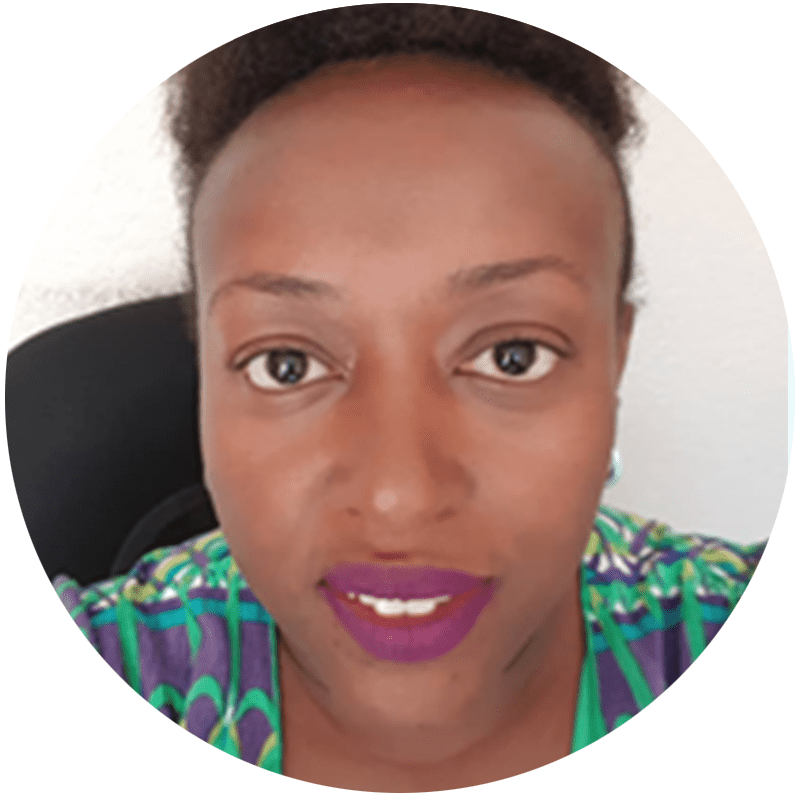
A pioneer in the documentation space, Emily Kankindi is the communications and documentation unit coordinator at World Relief in Rwanda. She started with World Relief in 2005 and has been growing through different stages while pursuing a career in creative communications with a passion to tell the story of impact. Driven by a mission to serve the most vulnerable, Emily is best known for inspiring others to care and serve the needy by using all possible means of communication to promote and call forth positive ramifications of WR interventions in all aspects of life. Her educational background is marketing and travel operations.
Breaking Barriers in Burundi: Women Who Make It Happen
Leocadie is a leader in so many ways. She’s a farmer, a wife, a mother to eight children and a grandmother of 20 — two of whom, she proudly says, are a set of twins who were born this past February.
For most of her life, though, Leocadie says women weren’t welcomed into leadership roles within the community nor were they empowered to be a part of making decisions for their families. But that began to change in 2010 when World Relief launched a savings program in her community and invited women, like her, to lead.
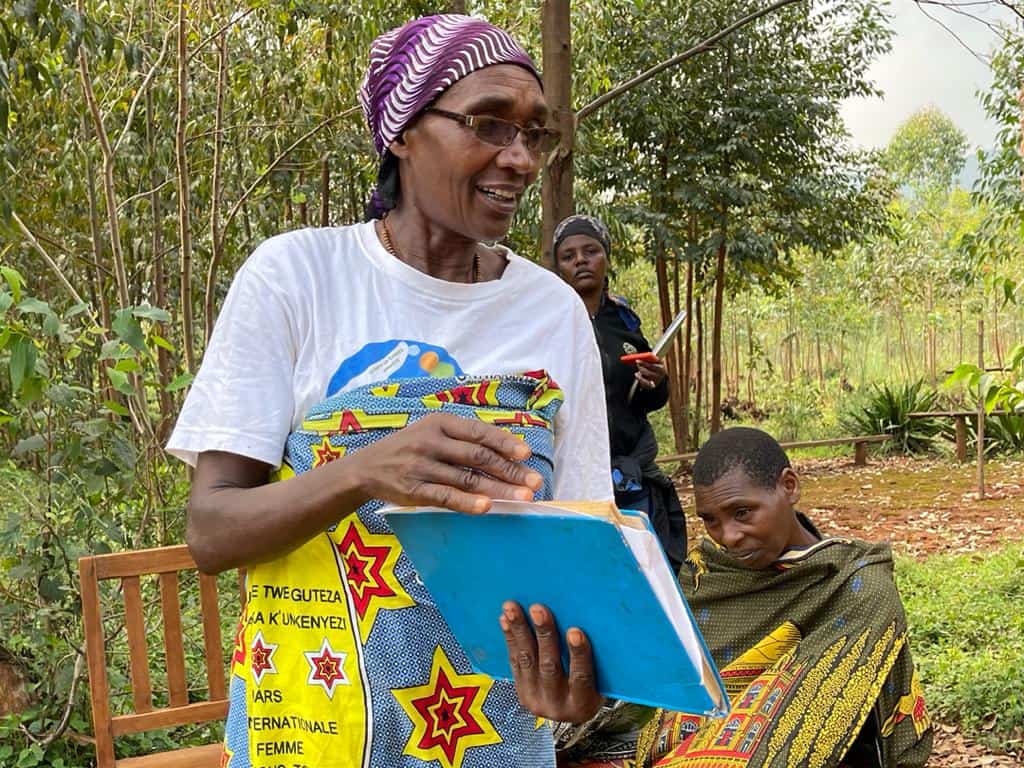
“When our group was formed I was elected to lead them. I took it as a privilege,” she said. “I was inspired by the interventions that [World Relief] was conducting because I saw them as a way to help others in my community who were going through many issues within their families.”
Over the next 11 years, Leocadie continued to grow as a leader. When World Relief launched agricultural programming in her community, she stepped up to lead in this area as well. And while the economic advancements she and her group have made by implementing new agricultural techniques and better financial management, the transformation her community has experienced in the area of gender equality is equally as remarkable.
“In the past, women were supposed to stay home and take care of the family, with their time mostly spent in the kitchen,” she said. “Now we participate in all decisions, at the colline (community) level. We have female leaders, savings group female leaders. I am very happy to see how I am respected by women and men. They listen to me because they see the impact of what I am doing.”
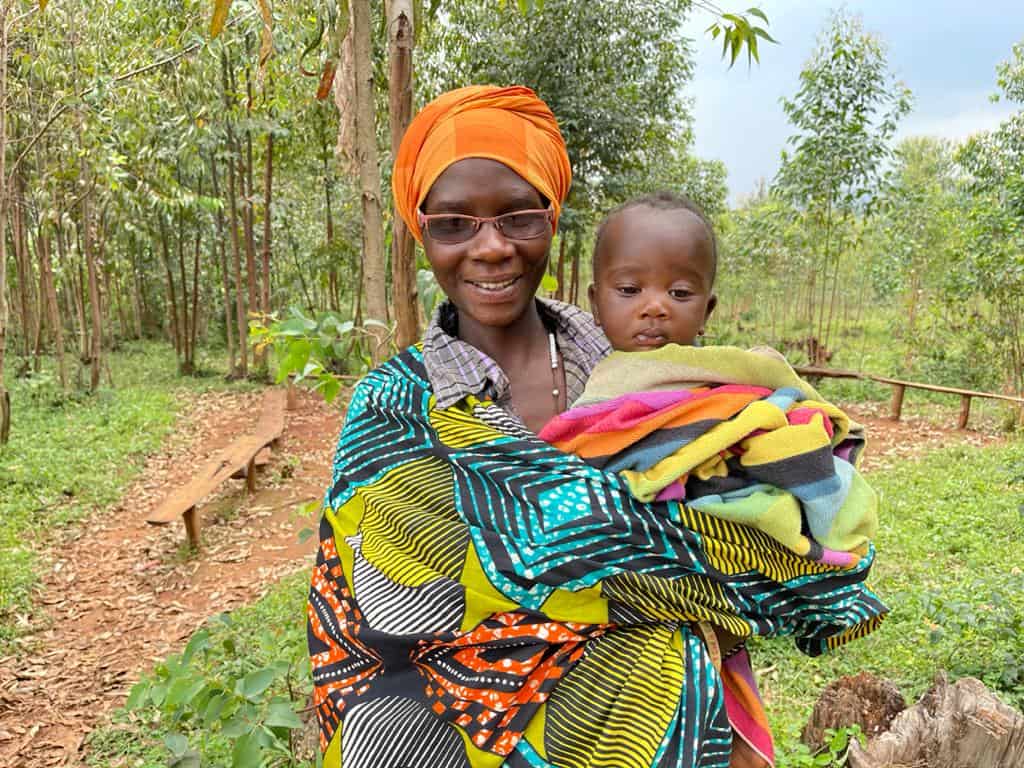
Leocadie’s leadership is rippling throughout her community. She’s created a sense of connectedness and support for women in her group like Jeane, the youngest member of the group, who says that learning from Leocadie has helped her grow as a mother and has improved her marriage.
“I am very happy to be part of this group,” Jeane said. “I am one of the youngest with two little children. I get an opportunity to be with wise women, grannies. Group members opened the door for me to learn from their marriages. As a result, I know how to be a better woman, and my husband and I discuss our feelings and make decisions together. ”
And it’s not just the women who are experiencing transformation. Pasteur Sinzumusi, the lone man in the group of 24 women, has increased his income, improved his marriage and totally shifted the way he views women thanks to Leocadie’s leadership.
Pasteur initially joined the group because he noticed the women were experiencing a better crop yield than he was.
“Before joining them, I had no savings at all,” he said. “I was farming in old fashion (outdated techniques), which did not have a good harvest. The reason I joined is because I saw their lives were different from mine. They had new skills and knowledge in farming, so I approached them.”
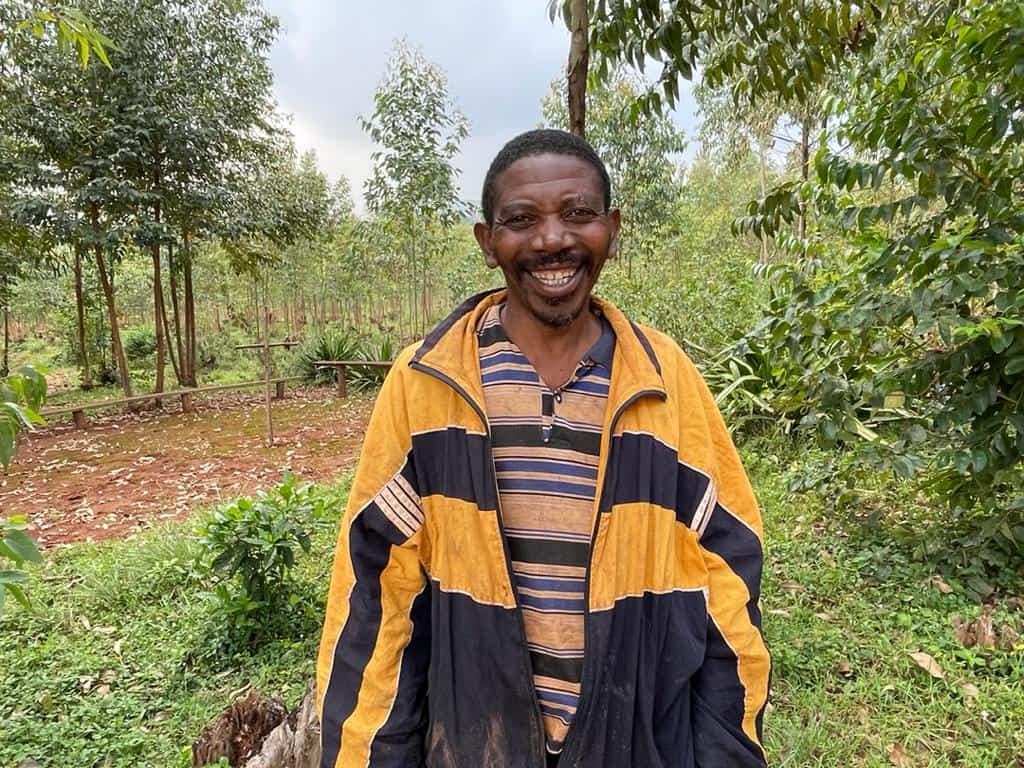
Today, Pasteur says his plot of land looks amazing, his income has increased and he can now easily afford to buy necessities like soap and send his kids to school. He attributes much of his success to the leadership of Leocadie and the community of women he has learned alongside.
“I respect my leader. She is just amazing. She does her duties well. Through her leadership, my way of viewing women has changed. Before I thought they couldn’t lead, but now I can testify that women are capable of leading. And this made me respect my wife and let her step into exercising her gifts.”
Leocadie is grateful for all the ways she’s seen her community transform. Women are more involved in community associations; marriages are more egalitarian in their decision-making; women participate in household management and can contribute financially.
She is hopeful to see her group continue to improve their farming and embrace new skills.
As we celebrate the accomplishments of women and the barriers they are breaking down, we echo the words of Pasteur when he said: “Women can do things as men. I invite all men to come to see how our association is well organized and well managed by female leadership. They will learn that women are good and great leaders.”
Millions of women, just like Leocadie, are choosing to challenge the limits placed on them and break through the barriers around them. Their daughters, granddaughters and great-granddaughters will know a world where women are respected, valued and lead. Will you join them in building a better world by giving today?
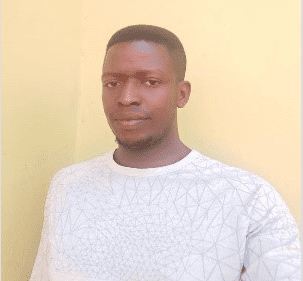
Ezechiel Hatungimana born and raised in Burundi with a passion of seeing his country developed holistically. Prior to World Relief, Ezechiel has served in a local organization aiming to empower the lives of people holistically, working directly with churches. While he is still completing his bachelor’s degree in Business Administration, He joined WR 2018 and he supervises a team of 20 people who equip 500 local churches. Ezechiel is married and blessed with two children. Ezechiel and his Family worship at PTI Church where he serves as a preacher.

Rachel Clair serves as a Content Writer at World Relief. With a background in creative writing and children’s ministry, she is passionate about helping people of all ages think creatively and love God with their hearts, souls and minds.
Crisis in Sudan: Responding to Violence and Empowering Women
Civil Unrest in Geneina
On January 16, 2021, civil unrest was reported in the Geneina area in West Darfur as a result of violence between Masalit and Arab tribesmen — groups that have had a long history of conflict over land and water resources. Tensions have continued to grow in the days since this recent bout of violence, resulting in:
- About 183,000 displaced people in the Darfur region, with an additional 3,500 who crossed the border into Chad*
- At least 470 deaths and 300 injuries
- An estimated 149,000 displaced people in West Darfur alone*
In crises such as these, women and girls are especially vulnerable. While women and girls in Sudan already face challenges due to their gender, these challenges become more pronounced when they are living in displacement camps as a result of violence in their communities.
The United Nations High Commissioner for Refugees (UNHCR) states that “sexual and gender-based violence (SGBV), including domestic violence and alcohol abuse, increases in such circumstances. Women and girls may be attacked as they look for firewood or water outside the camp”, and “As financial resources are depleted, adolescent girls are married off at increasingly younger ages”.
A Trusted Partner
Over the last several years, World Relief Sudan has become a trusted agency among the Sudanese people, other NGOs and the Sudanese government. This trust enabled our team to quickly respond to the latest humanitarian crisis in partnership with UN agencies and other INGOs.
World Relief Sudan was recently awarded $900,000 in emergency funds from the Sudan Humanitarian Fund (through the UNDP) to provide immediate humanitarian assistance.
Our emergency response thus far has included provision of potable water and emergency latrines, hygiene promotion training, mobile health services for pregnant women and children under five and distribution of basic non-food items for 39,000 internally displaced persons.
Unique Challenges for Women
World Relief Sudan is well aware of the specific challenges which women and girls face in such environments and is taking measures to prevent violence, protect vulnerable beneficiaries and support the agency and voices of women in their communities.
Among the many projects to provide for the immediate needs of displaced people, the emergency response team is working to ensure that all people in displacement camps have a clean water source less than 1km from their temporary dwelling.
These water points are fenced, to reduce the possibility of violence around these areas, as violence towards women is common when women travel outside of their villages to collect water. By reducing the distance to water points and fencing them in, women are at far lower risk of being attacked.
In addition, WASH (water, sanitation and hygiene) committees are being formed — and are composed of at least 40% women — to monitor the use and maintenance of said water points.
WASH committees are important because they ensure regular maintenance and orderly use of the access points. When women are on these committees, they can better emphasize the protection of women and children at water access points.
What’s more, because these committees are made up of local residents, they will continue in their work long after World Relief has left the area.
Challenging for Change
As the conflict in West Darfur continues, women, girls, men and boys are all receiving effective emergency services from World Relief Sudan to mitigate their present challenges.
These services are provided with special emphasis on gender protection and representation, challenging communities to change the way they engage with one another, and empowering women to take leadership roles in their communities.
*Update: As of May 12, 2021, the number of people displaced by the current conflict has increased:
- 151,400 IDPs in Geneina (West Darfur) from Jan-April 2021
- 65,000 newly displaced IDPs in April alone
- Total of 237,000 people displaced by conflict in the Darfur region in the first 4 months of 2021 – which is more than 4 times those displaced by conflict in all of 2020.

Lydia Dawson serves as World Relief’s Humanitarian and Disaster Response Unit Program Officer in Sudan, and in disaster response worldwide. Prior to joining World Relief, Lydia worked in homeless services and community development in Oregon and California. She is passionate about equity and honor for underrepresented groups, both locally and internationally.
Supporting Small Businesses in Cambodia: The Lion’s Den
It’s no secret that small businesses suffered throughout 2020. But thanks to a partnership with
Bent Tree Bible Fellowship, aspiring small business owners in Cambodia found support through World Relief.
Bent Tree has been partnering with World Relief for nearly 15 years. Through their Business as Missions initiative, Bent Tree staff and volunteers helped refine a business development curriculum that has been used to train World Relief Cambodia staff and savings program participants.
Most recently, Bent Tree church member and local business leader, Michael Cozzi, helped launch a new initiative in Cambodia called the Lion’s Den, which is similar to the TV program Shark Tank. Michael and Romroth Choun, World Relief Cambodia’s Program Operations Director, shared more about the new initiative and how they hope to see it grow.
Michael, how did you first get connected with World Relief?
M: In 2018, I traveled to Phnom Penh with a group from Bent Tree. We conducted business development trainings in partnership with World Relief Cambodia. But really the story began one year prior when I was encouraged to take a global missions class at Bent Tree. The Holy Spirit used that class to change my life. I learned what it meant to be mission-minded and leverage my gifts to carry out the Great Commission. Little did I know that less than one year later I’d be teaching biblically-based business development in Cambodia to some participants who had never heard of Jesus before.
What prompted you to bring Lion’s Den to Cambodia?
M: During my second trip to Cambodia, my co-leaderJackie Mosley and I collaborated with Brandon (World ReliefCambodia Country Director) on ideas to assist business development participants beyond just the trainings we conducted.
Some of the ideas included microfinance loans to small businesses. However, after reading reports on Cambodia’s debt problem, I realized the rapid rise of tiny microfinance loans often led Cambodians into more debt. So, I knew this option would not work.
That’s when God connected me with Lion’s Den — a Dallas-based organization that mobilizes Christian business leaders to invest their talents and resources for kingdom Impact. Lion’s Den gives entrepreneurs the opportunity to pitch their business plan to investors in hopes that they will fund their business for growth.
I felt God prompt me to bring Lion’s Den to Cambodia, and with Bent Tree’s spiritual, organizational and financial guidance, we pooled our resources and pitched the idea to the World Relief staff in Cambodia. Together, we launched the first Lion’s Den Cambodia pitch event in early 2020 and a second was successfully completed in the fall 2020.
Romroth, what were your initial reactions to Lion’s Den?
R: When Michael first brought the idea, I thought, “What is the Lion’s Den Pitch?” It was really a new learning experience. Michael helped us develop a rubric for learning, testing, idea analysis, and then he also added a spiritual component. Bent Tree has conducted business development training for several years. But we observed that most participants didn’t have many chances to expand or form new businesses, and that’s something I really wanted to see happen. So, God’s hand was really moving in the Bent Tree team’s heart.

What was the first pitch session like?
R: I felt a bit nervous because this was really new for both World Relief and the business candidates. Participants pitched grocery selling, chicken and pig raising and small food shops in the villages. We selected four winners from among nine candidates.
Some recipients received vocational training to open new businesses such as tailors and hairdressers. Others started raising livestock and other agricultural businesses. The agricultural businesses did well, but some of the others did not. There wasn’t much a of a market where those businesses opened. This is something further business development training would help solve.
*In all, 27 people submitted business plans to the Lion’s Den, and 12 received funding. In 2021, World Relief Cambodia has two more Lion’s Den events planned, and is excited to continue growing!
What do each of you hope to see come of this partnership in the future?
M: First, God put it on my heart to love, care and pray for the people of Cambodia. Beyond that, I feel the Holy Spirit leading me to grow Lion’s Den into more parts of Cambodia. I also hope to expand the Lion’s Den to other countries World Relief is working in as well. In the end, my heart is to love people everywhere as Jesus did through business and missions!
R: Partnering, to me, is sharing and caring about God’s Kingdom. I want to see at least 50% of our savings program members have a chance to form new businesses or expand current businesses in order to decrease poverty. This will bring the glory to God. I hope that with Bent Tree’s partnership we can figure this out.
What would you say to others in the marketplace about how they can leverage their gifts and resources to serve and empower others around the world? M: I would encourage people in the church with business experience to ask God how He wants them to participate, be it financially, spiritually or by sharing their business experience. I hope the Holy Spirit leads more men and women to use their God-given business talents to help the vulnerable start and grow new businesses. I see our partnership with World Relief as a channel to share the good news Jesus through biblically-based business development.
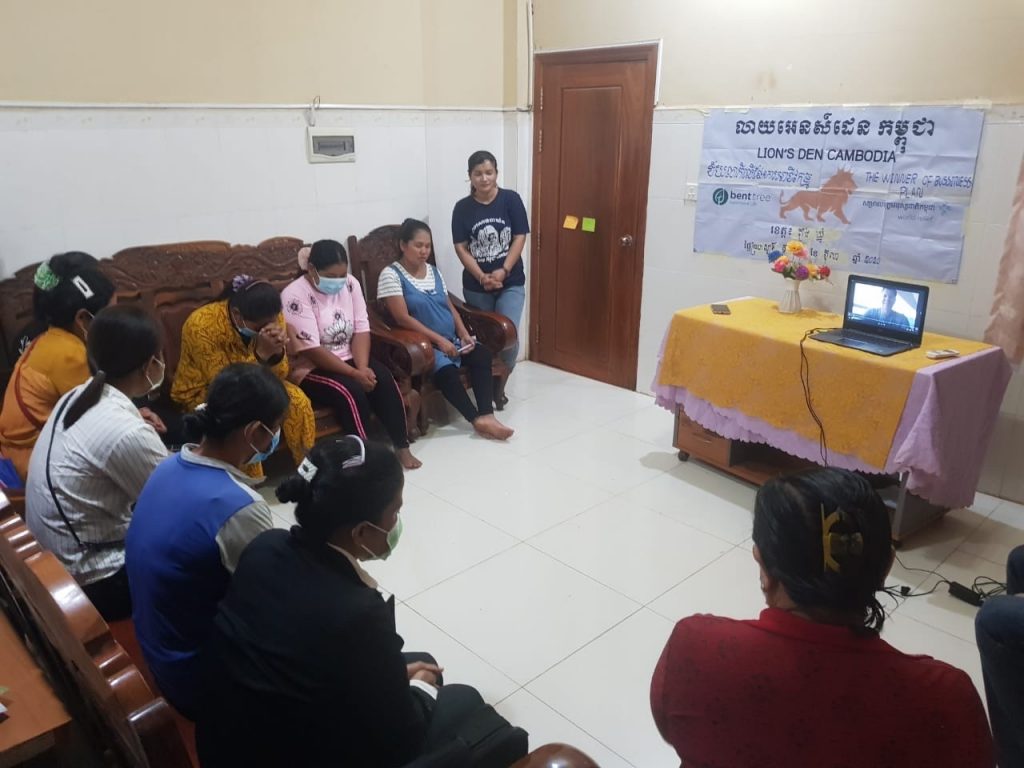
You and your church can support similar initiatives and empower communities across the globe by joining The Path.

Rachel Clair serves as a Content Writer at World Relief. With a background in creative writing and children’s ministry, she is passionate about helping people of all ages think creatively and love God with their hearts, souls and minds.
How it Started, How it’s Growing: World Relief Sacramento’s Welcome Club
In 2018, World Relief Sacramento volunteers Becca and Luke Voight began connecting with refugee youth at a local park. What started as an informal gathering has now grown into a robust program called The Welcome Club.
The Welcome Club partners with four area elementary schools to serve upwards of 100 students. Itoffers space for immigrant kids to ‘just be kids’. For many of these youth, schoolwork is difficult, and their guardians cannot give the same homework support that their American classmates receive. They are often translators for their parents and caretakers for younger siblings. Even if it’s just for an hour a week, The Welcome Club is where they can have fun with friends and coaches.
Like most of our U.S. programs, The Welcome Club had to make some big adjustments in 2020, moving all of its in-person programming online. I recently spent the day with WR Sacramento’s Children and Youth Manager, Makayla Synak, and got a first-hand look at the magic that happens at The Welcome Club, even in its virtual form. Follow along to learn more and find out how you can create communities of welcome for immigrants in the United States.
9:00 a.m.
Coach Makayla checks her car to make sure she has everything. Her trunk is full of children’s books, binders with waivers and forms, disposable face masks, hand sanitizer and craft supplies. Coffee cup in hand, World Relief blue t-shirt on, she leaves for the World Relief Sacramento office, which has been closed to clients since March of 2020.
9:30 a.m.
Makayla meets Coach Becca in the classroom at the back of the office. Becca, also masked and sporting her World Relief t-shirt, is adding printouts of song lyrics to 60 lunch bags on the floor. Every other Friday, Makayla, Becca and a small group of staff and volunteers take 60+ goodie bags to 12 apartment complexes for children and youth to unpack at their virtual Welcome Club that week.
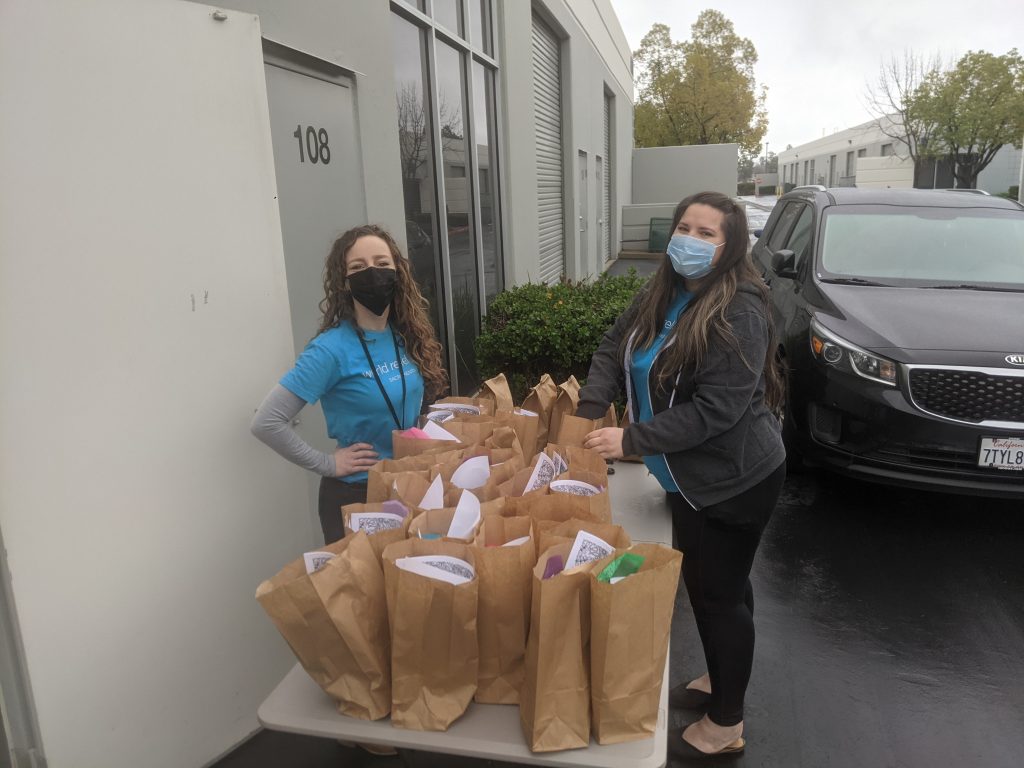
The bags are packed with goldfish crackers, contact paper and a booklet with the week’s Welcome Club theme: “Asking for Help and Giving Help.” Once filled, the bags are stapled shut with a note that says: DON’T OPEN UNTIL WELCOME CLUB. Becca and Makayla joke that most kids open their bags before club, but it’s worth a shot!
11:00 a.m.
Makayla takes a break from prepping goodie bags and logs into a Zoom meeting with a school vice-principal. This past summer, World Relief came together with local schools to talk about solutions for immigrant students who were falling behind due to COVID-19 and not logging onto Zoom for virtual learning.
Schools made a list of students who were struggling the most. Many of these students arrived in the U.S. just before the shutdown, and have never set foot in an American classroom. Since September, Makayla has logged 100 visits to over 50 of these families, checking in, walking through their assignments and giving them a laptop if they didn’t already have one.
12:00 p.m.
Makayla logs off Zoom and heads back to her car. She drives to the Las Palmas apartment complex, where many Afghan refugees live, to personally deliver 20 goodie bags. She barely sets foot in the courtyard when dozens of children and families approach and greet her excitedly. Ehsan, a seventh-grader who likes to help make deliveries, is among them.
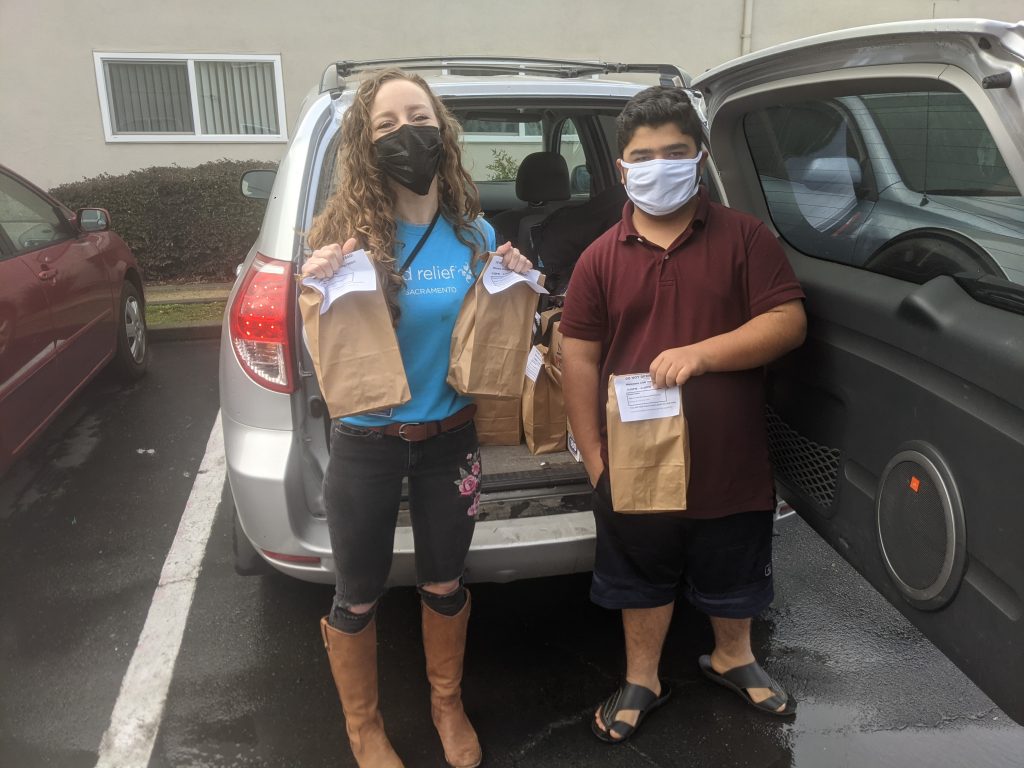
“I try to wait until he’s out of class,” Makayla says.
A group of children follow them from apartment to apartment. Mothers invite her in for tea. Her phone rings, and Makayla answers to help a student who is having an issue with her laptop. She stops to admire a girl’s braid, asks a boy about his school assignments, and greets everyone in Dari (the national Afghan language), which she’s trying to learn in her spare time.
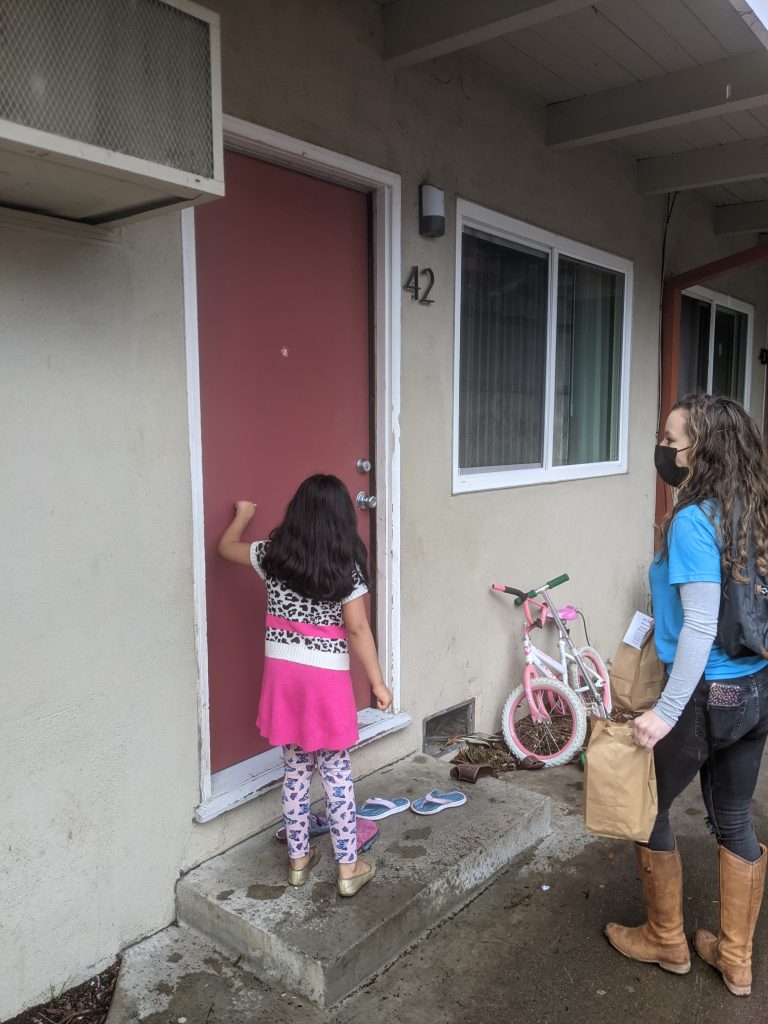
3:00 p.m.
Back at the office, Makayla and Becca log on to Welcome Club to meet with other staff and volunteers. Becca goes over the curriculum, assigning roles to each Coach. At 3:30, Makalya lets the students in from the waiting room, and soon two screens filled with 40 eager faces.
“Hi Coach Makayla! Hi Coach Becca!” The chat fills with messages of welcome and excitement.
“We are so happy you are here!” the coaches respond.
The students are always at the center of what Makayla and her team create — like the weekly Bad Banana videos that staff and students make together. Bad Banana is a character the team created to help illustrate the weekly themes.
Makayla dresses in a head-to-toe banana costume, draws on a mustache and puts on sunglasses. She is the “Bad Banana” who needs help from his Welcome Club friends. The name “Bad Banana” came from a nickname the students gave Makayla. Her name sounds like the word “kay-la” (phonetically spelled), which means banana peel in Dari, so students started calling her “Banana.”
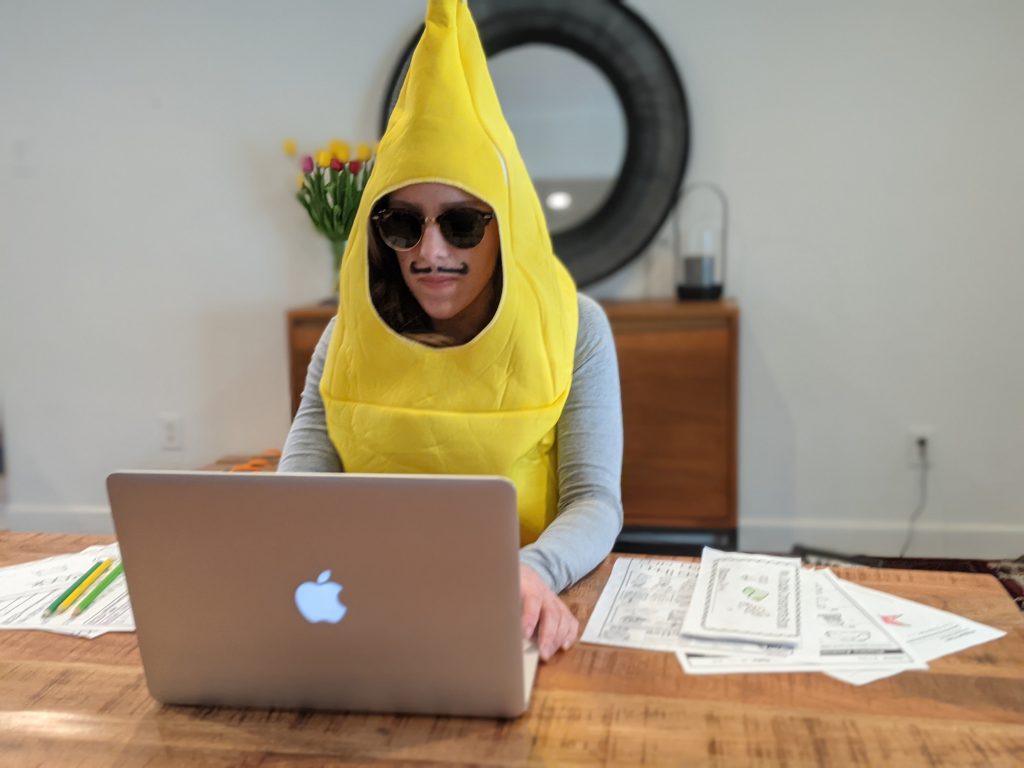
In this week’s video, Banana is struggling with distance learning. It’s too loud in his house and he can’t concentrate to do his schoolwork, so he calls his friend Horia from Welcome Club to ask her what to do. Horia tells Banana she was having a hard time, but then she asked Coach Makayla for help, and Makayla gave her headphones. Horia offers to ask on behalf of Banana, showing him what it means to be a helper.
4:00 p.m.
After the Coaches introduce themselves, students go into their breakout rooms where they play a game, talk about examples of when they gave and received help and complete the week’s craft together. During this time, Makayla moves in and out of breakout rooms.
4:30 p.m.
The students and coaches return to the main Zoom room. Makayla reminds them about tutoring on Tuesdays and Thursdays, and Becca shares the link to the latest Bad Banana video.
“Now, you have something fun to watch between now and the next Welcome Club,” she says.
The chat erupts with excited messages in response. Students sign off, though a few try to remain on for the coach’s debrief. Ehsan changes his name to “I’m a Coach!”
5:30 p.m.
After the staff debriefs, Makayla gathers up the remaining goodie bag items on the classroom floor. She makes a note of all the home visits she needs to schedule for the following week. She’s already thinking of ideas for next week’s club where they will introduce the new theme: perseverance.
Even after a full day, she is still energetic. The kids and their families make everything worth it. “Everyone who has ever succeeded at something had someone who believed in them,” she says. “I want to be one of those people who believe in them.”
There’s room for you to join staff and volunteers like Makayla as they make room for immigrants and refugees in the U.S. Give today to help programs like this flourish and enable our U.S. offices to start new ones! YES! I WANT TO GIVE
To find out about local opportunities like volunteering, donating supplies, or becoming a WR Sacramento donor, find your nearest local U.S. office pages below!
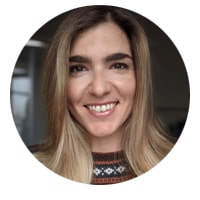
Vanassa Hamra serves as the Communications Manager for World Relief Sacramento. Her professional background is in creative writing and marketing, and she has worked in both the for profit and nonprofit sectors. She is passionate about storytelling and lives by the mantra that when you hear someone’s story, they move from being a stranger to becoming your neighbor.











